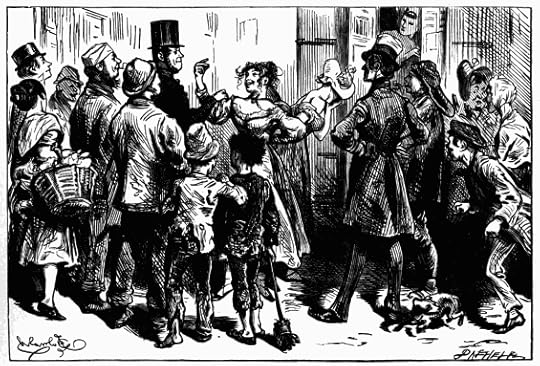The Pickwick Club discussion

This topic is about
Sketches by Boz
Sketches by Boz
>
Characters, 12: The Prisoners' Van
date newest »
newest »
 newest »
newest »
 This is a tragic story and would that it were shocking! Those young girls ought not have been punished. They had already received their punishment at the hands of their mother when she abandoned them to 'the game'. If anyone ought to be punished it is she!
This is a tragic story and would that it were shocking! Those young girls ought not have been punished. They had already received their punishment at the hands of their mother when she abandoned them to 'the game'. If anyone ought to be punished it is she!
 I just realized I posted the illustration Fred Barnard did for this sketch in the other thread, here it is again:
I just realized I posted the illustration Fred Barnard did for this sketch in the other thread, here it is again:
The Prisoner's Van
Fred Barnard
 A very impressive illustration: In the middle we have the brazen and hardened girl, and behind her her younger sister who turns away from the crowd. Both of them are very meagre, which shows that whatever they did they probably did it because they were born and raised in poverty.
A very impressive illustration: In the middle we have the brazen and hardened girl, and behind her her younger sister who turns away from the crowd. Both of them are very meagre, which shows that whatever they did they probably did it because they were born and raised in poverty.And I agree with Hilary, it's not the girls who ought to be punished. But it's always easier to fight the symptoms than the disease.
I also found it quite interesting that Dickens apparently also criticized the fact that for some people prison was even better than living in freedom (materially, at least) and that it also destroyed other people's lives. When he talks about the family of one offender being left destitute, he maybe had his own former life in mind?
 Yes, Tristram, you're right. I think that the debtor's prison loomed large in Dickens's life. It dogged his steps, always.
Yes, Tristram, you're right. I think that the debtor's prison loomed large in Dickens's life. It dogged his steps, always.Even nowadays there are those who avail themselves of the services of 'Her Majesty's Service'. To this end they commit petty crimes with a free turkey Christmas in mind. I think that they're on to a good thing: shelter, food, heat, light and camaraderie. It's a no-brainer! :D



The narrator then gives us a description of some of the prisoners who are mounting the van in order to be taken to different prisons. Amongst these he concentrates on a pair of sisters, one of them about 14 years of age, the other maybe 16. The gaudy dress they are wearing seems to imply that they are probably prostitutes. Whereas the young girl still seems to be ashamed of her situation, her elder sister is more callous and even makes light of their shame. The narrator then comments:
This passage might already hint that Dickens would later support measures and organizations aiming at giving these “fallen women” a second chance in life. It is also a first instance of foreshadowing the fate of Little Emily or characters like Nancy in Oliver Twist or Alice Brown in Dombey and Son. The narrator also comments on seeing “boys of ten, as hardened in vice as men of fifty” among the prisoners and “a houseless vagrant going joyfully to prison as a place of food and shelter, handcuffed to a man whose prospects were ruined, character lost, and family rendered destitute by his first offence.”
Obviously, as a mere spectator, he could not have known all these details and background stories, but one might say that here Dickens’s motivation to criticize social injustices clearly got the better of his role as a detached observer – and this is one of Dickens’s strengths as a writer.